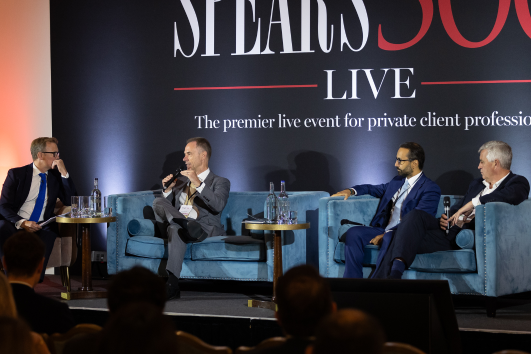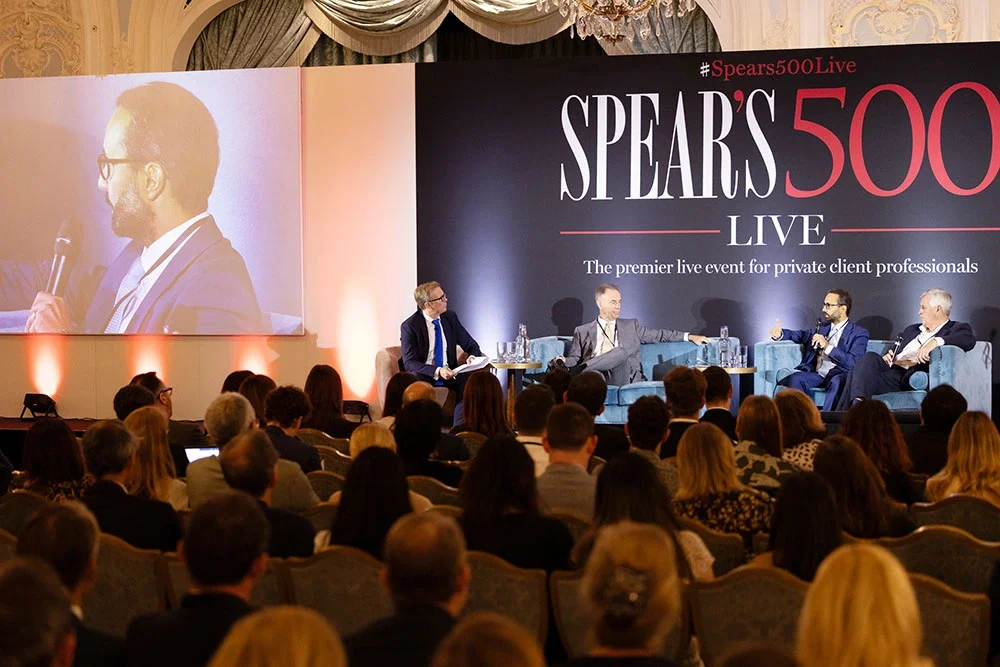
Amid a wave of consolidation in the industry, wealth management professionals are considering the best way to differentiate themselves to prepare for the future, or whether it’s a foregone conclusion that they’ll be absorbed into larger platforms.
An expert panel comprising CEOs of leading wealth management firms and private banks addressed the issue at Spear’s 500 Live, the premier live event for private client professionals, held on 28 June at the Savoy.
In a talk entitled Consolidation, differentiation and the future of wealth management, the speakers reflected on the changing face of their industry and the evolving demands of their clients.
And while things are indeed changing, the panellists emphasised that, above all, level of service and the value provided to clients is what will set the survivors apart.
Is consolidation the future of wealth management?
With lower fees, rising regulations and increases in fixed costs, wealth management firms are feeling pressure on margins and in many cases seeking economies of scale, leading to consolidation.
In the latest activity, Rathbones in April announced a £839 million deal to buy Investec Wealth & Investment UK, creating the biggest discretionary fund manager in the UK in terms of funds under management.
This follows Raymond James’ takeover of Charles Stanley for £278.9 million in early 2022; Royal Bank of Canada’s acquisition of Brewin Dolphin for £1.6 billion that same year, and Tilney’s acquisition of Smith & Williamson in 2020 for £625 million. And, in a different vein, Swiss banking giant Credit Suisse being subsumed into UBS in March, ending the former’s 167-year history.

[See also: Spears 500 Live 2023 – Why Canary Wharf faces its toughest challenge yet]
When it comes to consolidation, ‘operational gearing’ is the goal, said Paul Abberley, CEO of Charles Stanley Group. ‘The boutique model can work well, but when you get to a certain size, and with fixed costs rising, putting two firms together creates a single platform and higher profit margins – that’s what everyone has in mind.’
But it’s not inevitable.
‘Every year, at the beginning of the year, when you look at industry reports, they always say: this is the year of consolidation,’ said Mouhammed Choukeir, CEO of SG Kleinwort Hambros. ‘It’s been a theme that has been dominating the industry – and not just the wealth management industry.
‘I don’t think it’s inevitable, because, fundamentally, you can still deliver value if you are small, or if you are large. The question really is: ‘What is your value proposition to clients?’’
David Scott, chairman of Tribe Impact Capital and managing partner of Scott Capital Partners, agreed.
‘I think probably a number of firms really aren’t sure what their value proposition is – is it to be an asset manager, is it to provide wealth management advice and other services? For all CEOs, having absolute clarity around what their core proposition is, and what niche or market they’re trying to serve, is the key thing in terms of survival.’

[See also: Spear’s 500 Live – Time for a new Iron Curtain, says Bill Browder]
Size does matter
All agreed that size doesn’t necessarily equate to good service: ‘You don’t always need a big multi-service office,’ Scott noted.
‘It isn’t one-size-fits-all in terms of the scale,’ Choukeir said. ‘If you are only delivering asset management in a very specific niche market, you don’t need to be big. If you’re a multi-service institution and want to balance banking, wealth planning and any other type of services, then clearly that breadth requires a different size.
‘If you’re consolidating, the question comes back to: are we expanding our service, or deepening it?’
Abberley added: ‘All clients, whether they’ve got £2 million or £200 million, need a personal service; they need to have trust in the person working with them.’ That said, firms can’t ignore the requirement for an increasing assets under management minimum.
‘This year, having to adhere to the consumer duty regulations that are coming in, having to evidence everything you’re doing in that regard – that’s a fixed cost; you’ve got to have the software to do that,’ Abberley noted. ‘And that’s where the minimums come in, because you’ve got a fixed cost now for the infrastructure that sits behind the client delivery.’
Working with – not against – technology
Technology is also reshaping the industry, like it or not, with tools such as AI and machine learning already changing the job of wealth managers as well as the customer experience.
‘With AI, it’s not about how powerful it is – we know it’s very powerful. It’s how you create an environment where it can thrive,’ Choukeir said. ‘To use an example: you can create a fast car, but that’s not going to be safe without some speed limits, some speed bumps, some traffic lights, some regulation. And that’s where the conversation is right now – this thing is here to stay, it has a lot of potential, let’s create an environment where it can be done and used responsibly and safely.’

Abberley emphasised that there’s an important distinction in the value of digitalisation to retail customers versus HNW and UHNW, with the wealthier segments prioritising interpersonal trust and face-to-face advice – something he doesn’t see changing any time soon, ‘unless you believe that people will come to trust avatars’.
‘The digital side can augment that personal relationship,’ he explains. ‘In terms of having that investment manager, it’s almost like a digital exoskeleton, so they can provide all that digital enrichment to what remains a personal service.’
Future-proofing wealth management is about finding a niche
So how else can wealth managers differentiate themselves, apart from being crystal-clear on their value proposition?
Scott’s firm, Tribe Impact Capital, set out to deliver investment returns while also allowing investors to see that their money is being invested in companies that are trying to make a real change in the world in terms of the environment and society, producing a ‘feel-good factor’.
‘The investment management industry has focused too much on alpha, beta, gamma, delta or various investment jargon, and has ignored the emotional part of people’s wealth,’ he said. ‘People should feel good about investing their money.
‘People need to feel engaged with their money. And the level of engagement we’re currently seeing has been on a totally different level.’
Spear’s 500 Live 2023 brought together private client professionals in wealth management, private banking, philanthropy, luxury, law, property and more to make connections and strengthen their expertise around the forces that shape the lives of their ultra-high-net-worth clients.
Watch the full panel ‘Consolidation, differentiation and the future of wealth management’
Held at The Savoy in central London, Spear’s 500 Live 2023 was sponsored by Archax, the Charities Aid Foundation, HCA Healthcare UK, Henley & Partners, St. James’s Place Private Clients, and Unica Capital.







